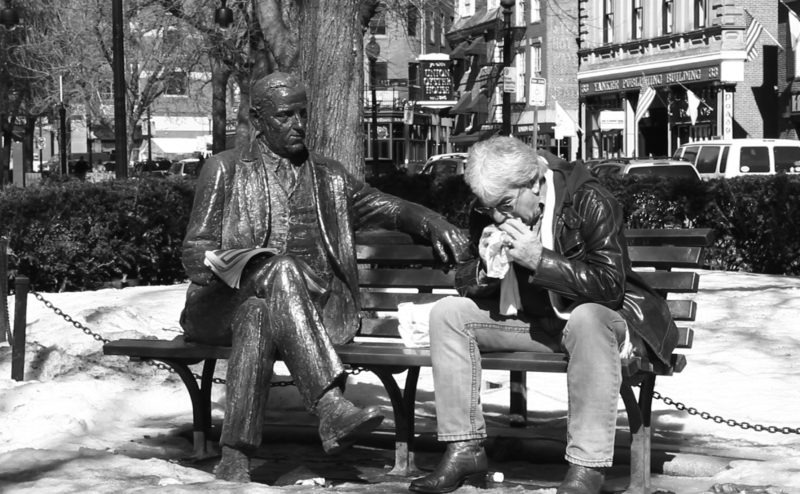
Filmmaking | Interviews | Massachusetts
Festival Award-Winner Interview: Billy Palumbo
Having won Best Experimental Film of the 2015 Online New England Film Festival, Curley: A Historiophoty by Billy Palumbo turns upside down our ideas about history and the production of ‘truth,’ all with a deconstructionist sense of humor.
“Don’t accept lack of fundraising as an obstacle.” Was there ever was a truer sentence said about filmmaking, we ask you? Here, Billy Palumbo talks about his short documentary aiming to create a “populist version of history” through the story of James Michael Curley (who, as it turns out is much more than ‘colorful and corrupt’).
Having won Best Experimental Film of the 2015 Online New England Film Festival, the film turns upside down our ideas about history and the production of ‘truth,’ all with a deconstructionist sense of humor. Watch Curley: A Historiophoty by Billy Palumbo as part of this year’s festival.
NewEnglandFilm.com: When did you know you wanted to become a filmmaker?
Billy Palumbo: When I was a teenager I started writing and shooting videos with my friends, always terrible, always very cliché.
When I was alone, though, I would just set the camera up and film myself doing whatever– cooking, playing with my dog, whatever. I’d start performing for the camera, creating a character that wasn’t quite me but wasn’t not me. And if you think about it, I’ve basically been making the same movie over and over ever since.
NEF: What inspired you to make your film?
Palumbo: I was interested in the mythos surrounding James Michael Curley pretty much as soon as I first heard of him. He’s referred to colorful and/or corrupt, but rarely does anyone bother to talk more about who he was, why he did what he did, whether he was really a bad guy or not, what impact he had, etc.
And at the time I was doing research about Curley, I was getting increasingly interested in populism, both as a political possibility but also as a social force. I was thinking a lot about how much we, laypeople, rely on ‘experts’ to tell us the ‘truth,’ tell us what we should do and what we shouldn’t– basically that the masses in American culture have handed power over to those in positions of ‘authority,’ be they political leaders or just anyone with credentials that we collectively agree are sufficient (i.e. historians).
But everyone has their own agenda, whether they know it or not, even if they think they are trying to suppress it. I saw a parallel between how Curley brought power to those who had been left out of power in Boston, the poor and the Irish, and my desire to see a more populist version of history. And I figured the only way to attempt a populist version of history was to tell it again, in my own way.
NEF: Where has the film been shown (festivals, other screenings, etc.)? Talk about a memorable experience with an audience?
Palumbo: The film has screened at Salem Film Fest, where it won Best Short in the Mass Reality Check program; Princeton Film Festival; Athens International Film + Video Festival; at a student documentary club at Emerson College, where I also gave a talk about Essay Film; and at Emerson’s Paramount Center.
At the Salem Film Fest, one audience member asked if I had considered making a feature-length film rather than a short, and I responded by talking about my pipe dream to make it a five-part film. This film would be Part One. Part Two would be a staged making-of entitled Behind the Scenes of: Curley: A Historiophoty by Billy Palumbo: An Ex-Post Meta-Making-Of/Reenactment by Billy Palumbo (This, incidentally, is currently in production).
Part Three would be an eight-hour film consisting of one long shot of me editing Part Two on my computer.
Part Four would be of a long conversation between me and my friends about how the films aren’t about history or Curley anymore and I’m losing sight of the story.
And Part Five would be a shot-for-shot remake of The Last Hurrah starring Spencer Tracy (this film was made based on a book that was inspired by Curley).
NEF: How did you find your cast and crew for this film?
Palumbo: With the exception of my friend Christina Hunt helping immensely with the recording of the voiceover and the sound mix, the production was an entirely solitary venture. Being alone allowed me to get some of the more memorable moments of the film without scaring away the tourists and Bostonians who were interacting with the statues and spaces I was filming (like the guy eating the sandwich and the woman falling down).
NEF: What else are you working on now?
Palumbo: The “sequel” to this film, actually, a faux-making of. I’m also working on an experimental silent film called Three Pieces that explores, roughly, ideas of order and trust. I’ve just completed a film called Figuring that I made collaboratively with my friend Kimberly Forero-Arnias. I’m also working on a book called What Can I Say, but that’s all I’ll say about that one.
NEF: Any advice on making films you want to share – about fundraising, working with actors, distributing, sending to festivals, etc?
Palumbo: Money will never make a movie. The more you think about fancy equipment or expensive effects or anything like that, the more you’re distracting yourself from whatever it is you want to say or whatever it was that made you want to make the movie in the first place. Don’t accept lack of fundraising as an obstacle. Any audience would be happy to watch a film shot only using expired VHS tapes, I’m sure, as long it has something to say, something to connect with, something to make them think, something to make them feel. Money and gear are the opposite of what a good film is — human.








